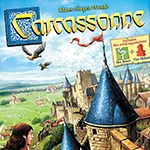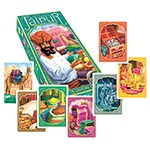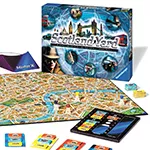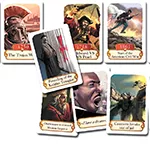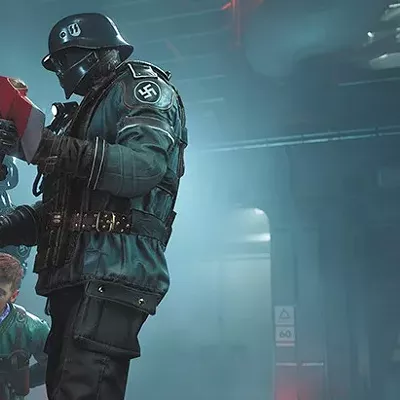CARCASSONNE
Old enough to be heading off to college, the 17-year-old tile-placement game Carcassonne remains one of the greatest tabletops I've ever experienced and, oddly enough, not incredibly popular. The simple game demands players to place tiles and build the board each turn, where players must place their drawn tile in that same turn. Players try to build empires on the maps, taking advantage of plots of lands on the tiles designated for cities and farms. Players accrue points from completing cities, farmlands and road extensions as the map reveals itself with each turn. The simplicity allows for a multitude of strategies such as simply trying to improve your own empire's progress or stealing the unfinished work of your adversaries. With two players, the game could be completed in as quickly as 30 minutes, with the tile pieces and progress markers fitting in a small bag. Ages 7 and up; $35
7 WONDERS
This game fulfills many of the fancies of "epic" tabletop players with a breezy pace once accustomed to the mechanics (gameplay ranges from 35 minutes to an hour). Each player represents one of the cities that house one of the seven wonders of the ancient world. Through three ages — each six turns long — players try and build-up production, trading, military or points towards victory. These are represented by the potential six buildings a player can create in an age. The goal, of course, is victory points, but with seven routes to points, strategy becomes a heavy factor, as players swapping and passing cards to start off each age. There is a tasteful amount of luck found in the game, but not enough to outweigh solid strategy. Ages 10 and up; $40
BETRAYAL AT HOUSE ON THE HILL
Like Clue on steroids, Betrayal at House on the Hill is a story-based mystery game that remains tense throughout the hour-long-on-average game. Players embark throughout a haunted house represented by a tile board that you expand as you explore the confines. This component not only makes for tension ratcheting but also a high replay value for players as you may not experience all of the rooms or all of the potential outcomes of rooms. Players investigate the house until "the haunt" is activated through a player roll. There on, players find out who among them are "survivors" and who is the "traitor." This creates different objectives for players (told only in specific passages in player handbooks) which are unknown to their opponents. The game before and after the haunt feels almost like two separate games, as the style turns from cooperative to all of a sudden competitive. Ages 12 and up; $50
JAIPUR
The premiere two-player game of the moment, Jaipur is a card game where players seek to be elite traders in the six different themed-goods cards ranging from leather to silks to jewels. Players compete in drawing random cards and cards available in the marketplace to use to compound the size of potential deals. There are also a set of tokens which signify the value of each deal, with the decks of tokens descending in value for each good. The game is a great combination of strategy and chance, as the 60-card deck allows for a randomness. The gameplay is rather quick and easily portable. Ages 12 and up; $25
SPANK THE YETI
At house parties it seems like a mere matter of time until the host breaks out the beaten and bruised black box housing the tired and hardly true Cards Against Humanity deck. Galactic Sneeze's Spank The Yeti maintains the vulgar sensibilities while structured for greater replay-ability. The game is set up with the "eff, marry, kill" questionnaire where, for a player's turn, they draw three action and object cards each. The other players must guess which object card would belong to an action card and earn points based off of how many match. Ages 17 and up; $25
GREAT WESTERN TRAIL
Of the games found on this list, Great Western Trail is without a doubt the most complicated. The 2016 game has on average a two-hour-long runtime, with players fashioning themselves as cow ranchers, trying to earn the most points by raising and shipping cows off to the game terminal of Kansas City. The idea is simple and the mechanics follow suit, but players will be left with a bevy of options in terms of earning points through quick deals, hiring workers, expanding buildings, moving your railway along the way. Thankfully, the game mechanics limit the possible actions players have each turn, which help adjust the scope of the game to not be incredibly overwhelming. It includes so many add-on possibilities throughout a sit-down, such as trade deals, ranch certifications and other compounding point systems, that most players will be checking the rulebook every now and then to see if they're making the right decisions. Ages 12 and up; $50
KING OF TOKYO
A family-friendly monster game, King of Tokyo serves as a battle royale as players try to be the last standing giant in control of the city. Only one monster can control Tokyo at a time and, therefore, is the target of all opponent attacks but can also offer retribution to all others in their turn. The turn is centered on rolling six dice to reveal the combination of healing, attack powers and energy cubes that the player receives, as well as a victory point if a player rolls three of the same dice in their turn. Energy cubes are the currency for the game's cards, which can alter the rules or deal quick damage to adversaries. The cards allow a bit of strategy to the dice-heavy game, but still with a lot fast-paced lead changes. Ages 8 and up; $40
SCOTLAND YARD
A hybrid competitive and cooperative game, Scotland Yard has one player — with the role of mastermind criminal "Mr. X" — attempting to evade the world-class detectives who are the remaining tabletop players. The board is a map of London, as each player draws a random starting point, with Mr. X trying to find the best escape path as the detectives move throughout the city. What is extra fun is that players receive a certain amount of transportation and move tokens depending on their role, with Mr. X receiving less transportation tokens but awarded double move and mystery move tokens depending on how many detectives there are. Detective pawns are placed on the board but Mr. X jots his location down each turn on a secret scoreboard, which is revealed on the third turn and subsequent fifth turns. And to make matters trickier, detectives' transportation tokens are given to Mr. X once used. If the detectives can't find Mr. X in 24 turns, the baddy won. Ages 8 and up; $40
TIMELINE
Rejuvenate your trivial Brainiac fun with one of the several sets of the card game Timeline. With sets focused on topics like American History, Inventions, Historical Events, Music & Cinema, Americana, Diversity, and even Star Wars, the game is straightforward and catered towards familiar topics but with the mechanics to make the game approachable for players who may not be an expert in certain fields. The cards will have a significant moment in the grand timeline of the set on one side, with its year listed on the back. Players will try and fit their cards into the timeline based off of moments already added by their opponents. This helps those unfamiliar with perhaps niche subjects try and find an easy possible alternative reference date to work with. The game is fast paced, with a game lasting around 15 minutes. Ages 8 and up; $15 a set ♦

